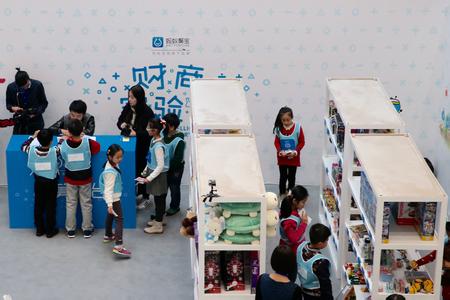(单词翻译:单击)
Shanghai, the financial center of China, sure has raised some money-savvy children.
上海是中国的金融中心,理所当然的,这个地方也养育了一些善于理财的孩子。
Ninety-two percent of Shanghai primary school students who took a recent test of their money smarts showed an understanding of financial management, and some even knew a thing or two about stocks and debts.
最近,上海的小学生参加了关于一项理财才能的测试,92%的孩子在测试中表现出了自己对于财务管理的理解,一些孩子甚至对股票和债务略有了解。
The FQ, or Financial Quotient, test was conducted on Wednesday at three primary schools. It was designed to measure the students’ ability to handle money, their understanding of spending and saving, and their knowledge of family finances and investment.
FQ,或者叫财商测试,于周三在三所小学进行。目的是测试小学生们掌控钱财的能力,他们对于消费和储蓄的理解,以及他们所具备的家庭财务和投资的知识。
One 8-year-old could identify six ways to make money - including investing in the stock and real estate markets, selling old toys and getting good grades, said Xu Ting, head of the FQ Lab at Ant Fortune, the mobile financing platform of Alibaba Group Holding.
蚂蚁聚宝财商实验室的许婷称,一个8岁的小学生可以列出6种挣钱的方式——包括投资于股票和房地产市场、卖旧玩具、考试得高分等。蚂蚁聚宝是阿里巴巴集团的移动融资平台。

The students scored 73 percent on average, surpassing the organizer’s assumptions about what children might be expected to understand about money management, Xu said. Twenty-six percent of the 200 test takers, who were ages 8 to 11, scored over 80 points, and only 8 percent notched under 60.
许婷说,参与测试的学生财商平均分为73分,这超出了组织者对小学生财务管理意识的预期。200名测试参与者的年龄都在8岁到11岁之间,其中26%得分在80分以上,仅有8%低于60分。
Asked about managing a New Year’s money gift, 61 percent of the students said they would deposit the money in the bank, while 31 percent said they would give it to their parents for investment. One student said he would lend the money to relatives to buy property - and charge interest.
当被问到如何处理新年红包时,61%的学生说会把钱存到银行,而31%的学生说会把钱交给父母作为投资。一名学生说他会把钱借给亲戚购买房产——并且收取利息。
Not all of the students who were tested had received financial education. Money education there is integrated into classes to teach students responsibility, teacher Xue Lei said.
教师薛磊说,并非所有参与测试的学生都受过财务教育。金钱观教育会融入到课堂教学里,教育学生们要有责任感。


